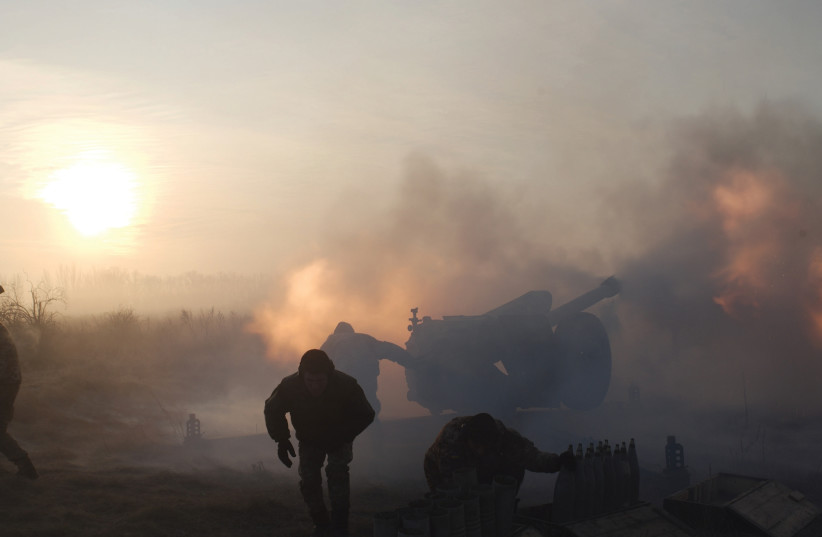In recent days Ukraine has been pressing Israel to take a clear stand over escalating tensions between Kyiv and Moscow. But it is important to clarify that this is something Israel cannot do.
As tensions between Russia and Ukraine continue to escalate, Israel has no choice but to tread extremely carefully, and to avoid making statements in support of either side.
Doing so could cause severe harm to relations with the United States on the one hand, or with Russia on the other. Israel’s security in the Middle East relies to a large extent on maintaining proper relations with both superpowers, even though the US is of course Israel’s number one strategic ally.
Israel has been able to roll back Iranian entrenchment efforts in Syria, in part through its ability to maintain good relations with Russia. Israel therefore cannot allow itself to enter into this divide – and it must hope that nothing happens that will end up forcing Israel to take sides.
Beyond Israel’s considerations, it is also important to note that troubled relations between Russia and Ukraine stretch back centuries. Ukraine was never just another country for Russia, and conflict is no stranger to that part of the world.

In the 20th century, Ukraine was Russia’s wheat basket, and its agriculture helped feed the whole of the Soviet Union. In 1932 and 33, Stalin caused mass starvation that killed millions of Ukrainians as part of a deliberate policy to punish attempts by Ukrainian farmers to gain some independence.
In addition, Ukraine’s position on the Black Sea and its Crimean Peninsula represents a hugely important strategic asset for Russia, due to its position as a passageway to warm waters further south. Russia cannot access warm waters from the north, or to the west, where the Baltic Sea freezes in winter, and its eastern coast is near Japan. Hence Russia attaches great importance to its ability to move ships to the Black Sea and from there south to the Mediterranean Sea and the Red Sea, as well as the Indian Ocean, to defend itself in case of a global war with the West.
Russia has always worked to secure warm water bases for itself, including in the Suez Canal under the Soviet era and the Horn Africa, and from 2015 onwards, on the Syrian coastline.
After invading Crimea, Russia is now consolidating its position in this regard.
For Moscow, Ukraine is also a passage zone of energy from Russia to all of Europe. In 2014, when Ukraine underwent a revolution that toppled a pro-Russian government, the Russians froze gas exports to Ukraine, and all of Western Europe suffered shortages as a result.
Many in Europe had to buy electric stoves to heat their homes in place of Russian gas that ran dry.
Within Ukraine itself, the eastern section is filled with mostly Russian-speaking people who support close ties with Moscow, while the western half is made up mostly of Ukrainian speakers.
RUSSIA VIEWS the Ukraine as a safety ‘brake zone’ for perceived Western threats. During a 2018 NATO meeting in Bucharest, Romania, the alliance said it would positively consider requests to join it from Ukraine and Georgia. Upon hearing about this, several Israeli diplomats felt this would undoubtedly cause Russia to end up doing all that it could to prevent NATO’s borders from reaching Ukraine itself.
One possible outcome is Russia seeking to take control of these countries. This view was strengthened further when Russia came out against the West’s support for Kosovan independence, with the claim that minority self-determination must occur only in agreement from the state in which the minority exists.
Russia justified its invasion of Abkhazia and South Ossetia, both of which have Russian-speaking majorities, during the 2008 war with Georgia, by claiming that if Kosovo deserves independence, so do both of those territories.
Against this background, it is clear that Russia will not permit in any way for NATO to expand eastwards to Ukraine or northwards to Georgia. Hence, it has focused its forces on the border with Ukraine to twist the arm of the Americans on this issue.
The question of whether Russia will end up invading soon can only be answered by prophets. But what can be said is that an arm-wrestling match is underway and that Russia views Europe as weak, while it also sees that the US is refusing to take responsibility for events outside of its borders. It notes that Washington has no interest in conflict in Europe, East Asia, or the Middle East. Hence, it feels that the situation is in Russia’s favor and that it can flex its muscles.
Russia’s decision to attack or not largely depends on what the US is willing to do. The more muscles that the US flexes, the less willing Russia will be to invade, and vice versa.
The Russian threat to freeze gas supplies to and via Ukraine is a double-edged sword since Russia needs to sell this gas. Ultimately, if Russia senses a real willingness by the West – militarily (less likely) or economically (more likely) – to go full force in its response, this would reduce the chance of an invasion, or limit it to Ukraine’s eastern side, which in any event supports Russia.
When the US is unwilling to take bold steps, this impacts all of America’s allies, including Israel, but at the same time, there are limits to this effect – since Israel never expected anyone to fight with it or for it against its adversaries.
The writer served as Foreign Ministry senior deputy director-general and deputy director-general in charge of the Central Europe, Eurasia and Russia division. He is a publishing expert with The MirYam Institute.
